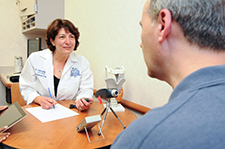Movement Disorders Center
The team at the Parkinson's Disease and Movement Disorders Center at Henry Ford has decades of experience diagnosing and treating Parkinson's disease, tremor, dystonia and other movement disorders.
Our Movement Disorders Center is also actively involved in the investigation of new medical and surgical therapies, and we offer patients the opportunity to participate in these clinical trials. Learn more about movement disorders research.
Movement disorders we treat
Movement disorders produce abnormal motions or lack of movement that may involve the head, voice, tongue, arms and legs. They may produce muscle contractions that cause involuntary and painful rigidness and twisting of muscles. Some of these diseases are also associated with cognitive (mental) decline, such as Parkinson's and Huntington's diseases.
Our team offers expertise in diagnosing and treating:
- Parkinson's disease
- Essential tremor
- Dystonia
- Huntington's disease
- Multisystem atrophy
- Normal pressure hydrocephalus
- Pantothenate Kinase-associated Degeneration (PKAN or Hallervorden-Spatz)
- Restless leg syndrome
- Sydenham's chorea
- Tardive dystonia
- Wilson's disease
Expert movement disorder diagnosis

Some movement disorders arise spontaneously. For others, the cause may be genetics, the environment, trauma, stroke or a combination of these factors. In some cases, medications or metabolic abnormalities may cause the movement disorder. Specialists at our movement disorder center perform a thorough neurological examination, along with blood and urine tests and MRI of the brain, to make a precise diagnosis of your condition.
Personalized movement disorder treatment at Henry Ford
Once we obtain a diagnosis, our specialized movement disorder team tailors treatment to your specific combination of symptoms. We offer comprehensive care with medications, physical and occupational therapy and assistive devices to help you return to daily activities.
If medication has not provided you with adequate relief and your condition is affecting your quality of life, you may be a candidate for surgery. Surgical implantation of deep brain stimulation devices aims to control the disabling symptoms of Parkinson's disease, essential tremor and dystonia. The Department of Neurosurgery at Henry Ford has a record of excellence in the surgical treatment of patients with movement disorders.
.svg?iar=0&hash=F6049510E33E4E6D8196C26CCC0A64A4)

/hfh-logo-main--white.svg?iar=0&hash=ED491CBFADFB7670FAE94559C98D7798)
